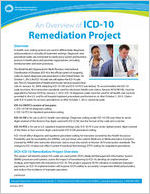An Overview of ICD-10 Remediation Project
Overview
In health care, coding systems are used to differentiate diagnoses and procedures in virtually all treatment settings. Diagnostic and procedural codes are connected to nearly every system and business process in health plans and provider organizations, including reimbursement and claim processes.
The World Health Organization's Ninth Revision, International Classification of Diseases (ICD-9) is the official system of assigning codes to report diagnoses and procedures in the United States. On October 1, 2013, the ICD-10 code sets will replace the ICD-9 code sets. The U.S. Department of Health and Human Services issued a final rule on January 16, 2009, adopting ICD-10-CM and ICD-10-PCS (see below). To accommodate the ICD-10 code structure, the transaction standards used for electronic health care claims, Version 4010/4010A, must be upgraded to Version 5010 by January 1, 2012. ICD-10 diagnosis codes must be used for all health care services provided in the U.S. and for all hospital inpatient procedures performed on or after October 1, 2013. Claims with ICD-9 codes for services provided on or after October 1, 2013, cannot be paid.
ICD-10-CM/PCS consists of two parts: 1. ICD-10-CM for diagnosis coding 2. ICD-10-PCS for inpatient procedure coding
ICD-10-CM is for use in all U.S. health care settings. Diagnosis coding under ICD-10-CM uses three to seven digits instead of the three to five digits used with ICD-9-CM, but the format of the code sets is similar.
ICD-10-PCS is for use in U.S. inpatient hospital settings only. ICD-10-PCS uses seven alphanumeric digits instead of the three or four numeric digits used under ICD-9-CM procedure coding.
ICD-10 will affect diagnosis and inpatient procedure coding for everyone covered by the Health Insurance Portability and Accountability Act (HIPAA), not just those who submit Medicare or Medicaid claims. Everyone covered by HIPAA who transmits electronic claims must also switch to Version 5010 transaction standards. The change to ICD-10 does not affect Current Procedural Terminology (CPT) coding for outpatient procedures.
DCH ICD-10 Remediation Project Overview
This project will identify where ICD codes are used within DCH's Medicaid Management Information System (MMIS) processes and systems, assess the impact of transitioning to ICD-10, develop an implementation strategy and implement the transition to ICD-10. This project supports DCH's initiative to eradicate improper payments; an ICD-10 implementation will improve DCH's ability to accurately compensate Medicaid providers, and reduce the incidence of improper payments.
continued
Georgia Department of Community Health | 2 Peachtree Street NW, Atlanta, GA 30303 | www.dch.georgia.gov | 404-656-4507
January 2012
An Overview of ICD-10
Project Justification
ICD-9 is 30 years old, has outdated terms, and is inconsistent with current medical practice. Also, the structure of ICD9 limits the number of new codes that can be created, and many ICD-9 categories are full.
Compared to ICD-9, the updated ICD-10 code sets allow more specific and precise descriptions of a patient's diagnosis and classification of inpatient hospital procedures. ICD-10 will accommodate newly developed diagnoses and procedures, innovations in technology and treatment, performance-based payment systems, coordination of patient care, and more accurate billing.
Medicaid agencies--as well as other payers, providers and agencies--will be able to use the enhanced information for various functions, including:
Improved care management of beneficiaries Increased efficiency through identification of specific health conditions, diagnoses and procedures B etter data for fraud and abuse monitoring; links to electronic health records; strategic planning for member, provider and benefit service improvements Quality assurance of clinical and administrative processes
Expected Benefits to DCH
Increased operational support and strategic planning Improved claims adjudication and reimbursement rates between provider and health plans due to more accurate payments for new procedures, and fewer miscoded and rejected claims due to greater specificity in ICD-10 codes Improved utilization management through the efficient use of ICD-10 diagnosis and procedure codes by payers and providers and the exchange of patients' profile information Reduction in paper work (for attachments) to explain the patient's condition Improved patient safety and care from sharing ICD-10 granular data on drug side effects and usage among health plans, providers and life science companies Improved clinical, financial and administrative performance
Project Phases
The ICD-10 project will be implemented in four phases: Phase 1 will provide valuable insight into the preparedness of each functional area Phase 2 will evaluate all departments to determine which applications and business processes are affected by ICD-10. This phase will identify pertinent reports, interfaces and technologies will determine dependencies and examine the relationships between processes and the applications supporting them Phase 3 will focus on the implementation of the planned remediation of the MMIS solution Phase 4 will lead to the stabilization of the MMIS solution via its operations
DCH is also engaged in the following CMS Compliance Activities:
As of December 31, 2010, internal testing of Version 5010 was underway to achieve Level I Version 5010 compliance Version 4010 claims continue to be accepted
continued
An Overview of ICD-10
Centers for Medicare & Medicaid Services (CMS) 5010/ICD-10 Compliance Dates
December 31, 2011 External testing of Version 5010 for electronic claims must be complete to achieve Level II Version 5010 compliance
January 1, 2012 All electronic claims must use Version 5010 Version 4010 claims will be accepted through March 31, 2012
October 1, 2013 Claims for services provided on or after this date must use ICD-10 codes for medical diagnosis and inpatient procedures CPT codes will continue to be used for outpatient services
References The ICD-10 final rule is available at: edocket.access.gpo.gov/2009/pdf/E9-743.pdf Centers for Medicare and Medicaid Services website: www.cms.hhs.gov/ICD10 National Center for Health Statistics (NCHS) website: www.cdc.gov/nchs/icd.htm
